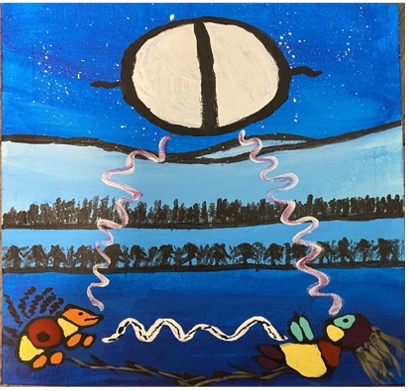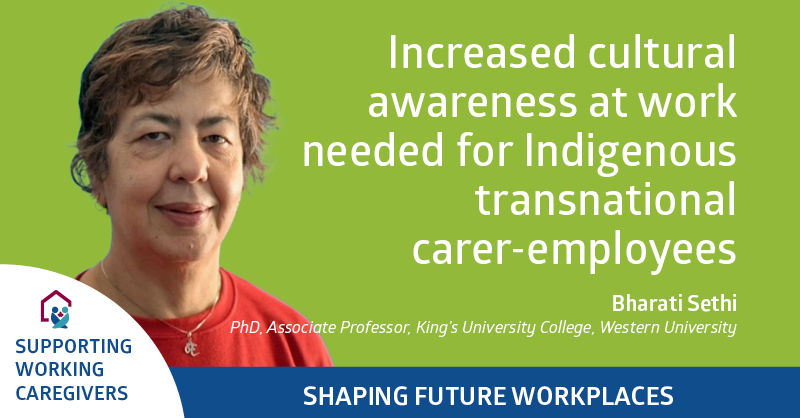The Indigenous Experience and Complex Relationship with Employment: Providing Informal Care During COVID-19
This study is about understanding the impact of COVID-19 on Indigenous transnational carer-employees.
While honouring Indigenous culture, diverse ways of knowing, and Indigenous research methods, this study was undertaken to explore the caregiving experiences of peoples who identify as First Nations, Métis or Inuit, are 18+, reside in Ontario, and work while providing care simultaneously to an adult family member or loved one. We also explored the impact of COVID-19 on caregiving- and employment- related roles and duties to better understand how to best accommodate carer-employees, provide guidance to employers, and determine necessary resources.
Though the need for family carers in Canada is increasing, the caregiving contribution fails to account for the quickly growing immigrant, visible minority, and Indigenous populations (First Nations, Métis and Inuit) who make up a great portion of unpaid carers in Canada. Specifically, Indigenous populations are growing at rates nearly four times faster than their non-Indigenous counterparts, and the portion of those living passed age 65 has increased 2.5% since 2016.[i] Aging Indigenous populations are at significantly higher risk for chronic illnesses/conditions and lack access to primary health care services. As a result, there is increased reliance on family members or loved ones for unpaid care which has been further complicated by the pandemic.
This study focuses on Indigenous transnational carer-employees (TCEs) who are identified as those who reside and work in Ontario, while simultaneously providing care to adult family members, friends or neighbors who are living with a disability or have age-related needs elsewhere or in another country/province where the impact of COVID-19 has made it exceedingly difficult for unpaid carers to provide care.
Community-based participatory methods[ii] were used with 10 Indigenous participants from across Ontario. Purposive and snowball sampling, where the researcher depends on existing research participants to help identify other potential subjects, was used for recruitment. Arts-based ethnography was used to provide context and for the purpose of thematic analysis through artwork and storytelling.
 “The white wavy lines are lines of communications. This is what they represent in Woodland art. We have one line of communication directly connecting us, but we each also have a line of communication to the moon (grandmother) and that show that we also connect through spirit and prayer as we are away from each other right now. We are connected by the roots underneath us, Mother Earth” -Alexis
“The white wavy lines are lines of communications. This is what they represent in Woodland art. We have one line of communication directly connecting us, but we each also have a line of communication to the moon (grandmother) and that show that we also connect through spirit and prayer as we are away from each other right now. We are connected by the roots underneath us, Mother Earth” -Alexis
Indigenous research methods that were used included: offering participants medicine bundles and tobacco ties so that interviews could begin in virtual ceremony, establishing a connection with the participant before recruiting them into the study, and basing the interviews on the sharing of traditions and stories.
Preliminary thematic analysis revealed the following three key themes:
- Duty/necessity to provide care
- Caregiver burden and distress
- Establishing connection and relationship are central aspects of Indigenous being
The impact of COVID-19 on the ability to provide care to loved ones significantly exacerbated feelings of caregiver burden and distress. The isolation and inability to maintain relationships and connections in person, due to the pandemic restrictions, were an additional source of stress for the majority of participants; for example, many were unable to attend ceremonies and engage in other cultural practices that rely heavily on gathering together on the land. From the study evidence, proper supports and increased cultural awareness are needed in the workplace for Indigenous TCEs to best mitigate negative effects that can come from caregiver burden and distress.
By highlighting this research, we can inform policy and practices to better accommodate the diverse needs of Indigenous TCEs.
References
[i] Statistics Canada. (2018). First Nations People, Métis and Inuit in Canada: Diverse and Growing Populations. Minister of Industry, 2018.
[ii] Community-based participatory research is a collaborative approach that engages all stakeholders throughout the research process.
ABOUT THE PROJECT
Carers Canada is leading the knowledge mobilization activities for a multi-sectorial research program to spread and scale a carer-friendly workplace standard, known as the Carer-Inclusive and Accommodating Organizations’ Standard (CSAB701-17). Led by Dr. Allison Williams, CIHR Research Chair in Gender, Work and Health at McMaster University, the research program consists of six inter-related sub-projects that will: increase awareness of the standard across Canada; evaluate readiness to change; determine feasibility and cost benefit; embrace cultural competency; consider Indigenous perspectives; and create an international standard. Visit PARTNERSHIP PROJECT SITE here

CIHR/SSHRC Healthy Productive Work Partnership Grant “Scaling up the Career Inclusive Accommodating Organizations Standard” FRN: HWP-146001 (CIHR); 890-2016-3018 (SSHRC).
 Bharati SethiMarch 3, 2022
Bharati SethiMarch 3, 2022

The Indigenous Experience and Complex Relationship with Employment: Providing Informal Care During COVID-19
This study is about understanding the impact of COVID-19 on Indigenous transnational carer-employees.
While honouring Indigenous culture, diverse ways of knowing, and Indigenous research methods, this study was undertaken to explore the caregiving experiences of peoples who identify as First Nations, Métis or Inuit, are 18+, reside in Ontario, and work while providing care simultaneously to an adult family member or loved one. We also explored the impact of COVID-19 on caregiving- and employment- related roles and duties to better understand how to best accommodate carer-employees, provide guidance to employers, and determine necessary resources.
Though the need for family carers in Canada is increasing, the caregiving contribution fails to account for the quickly growing immigrant, visible minority, and Indigenous populations (First Nations, Métis and Inuit) who make up a great portion of unpaid carers in Canada. Specifically, Indigenous populations are growing at rates nearly four times faster than their non-Indigenous counterparts, and the portion of those living passed age 65 has increased 2.5% since 2016.[i] Aging Indigenous populations are at significantly higher risk for chronic illnesses/conditions and lack access to primary health care services. As a result, there is increased reliance on family members or loved ones for unpaid care which has been further complicated by the pandemic.
This study focuses on Indigenous transnational carer-employees (TCEs) who are identified as those who reside and work in Ontario, while simultaneously providing care to adult family members, friends or neighbors who are living with a disability or have age-related needs elsewhere or in another country/province where the impact of COVID-19 has made it exceedingly difficult for unpaid carers to provide care.
Community-based participatory methods[ii] were used with 10 Indigenous participants from across Ontario. Purposive and snowball sampling, where the researcher depends on existing research participants to help identify other potential subjects, was used for recruitment. Arts-based ethnography was used to provide context and for the purpose of thematic analysis through artwork and storytelling.
 “The white wavy lines are lines of communications. This is what they represent in Woodland art. We have one line of communication directly connecting us, but we each also have a line of communication to the moon (grandmother) and that show that we also connect through spirit and prayer as we are away from each other right now. We are connected by the roots underneath us, Mother Earth” -Alexis
“The white wavy lines are lines of communications. This is what they represent in Woodland art. We have one line of communication directly connecting us, but we each also have a line of communication to the moon (grandmother) and that show that we also connect through spirit and prayer as we are away from each other right now. We are connected by the roots underneath us, Mother Earth” -Alexis
Indigenous research methods that were used included: offering participants medicine bundles and tobacco ties so that interviews could begin in virtual ceremony, establishing a connection with the participant before recruiting them into the study, and basing the interviews on the sharing of traditions and stories.
Preliminary thematic analysis revealed the following three key themes:
- Duty/necessity to provide care
- Caregiver burden and distress
- Establishing connection and relationship are central aspects of Indigenous being
The impact of COVID-19 on the ability to provide care to loved ones significantly exacerbated feelings of caregiver burden and distress. The isolation and inability to maintain relationships and connections in person, due to the pandemic restrictions, were an additional source of stress for the majority of participants; for example, many were unable to attend ceremonies and engage in other cultural practices that rely heavily on gathering together on the land. From the study evidence, proper supports and increased cultural awareness are needed in the workplace for Indigenous TCEs to best mitigate negative effects that can come from caregiver burden and distress.
By highlighting this research, we can inform policy and practices to better accommodate the diverse needs of Indigenous TCEs.
References
[i] Statistics Canada. (2018). First Nations People, Métis and Inuit in Canada: Diverse and Growing Populations. Minister of Industry, 2018.
[ii] Community-based participatory research is a collaborative approach that engages all stakeholders throughout the research process.
Bharati Sethi is an Associate Professor at the School of Social Work, King’s University College. She utilizes participatory and arts-based methods to highlight social determinants of health in immigrants’ lives and capture their relevance to social justice. She has contributed to 51 peer-reviewed publications, one edited book, and over 100 public presentations in the last ten years. Her research projects totalling 4.5 million dollars has earned her prestigious community and academic awards. She was interviewed by the Free Press, Sarnia and Lambton County, Globe and Mail, CBC, 980 CKNW, Toronto Star, and Conversations Canadian Press on her research with racialized personal support workers.
LinkedIn: @bharati-sethi-a9ab1949
ABOUT THE PROJECT
Carers Canada is leading the knowledge mobilization activities for a multi-sectorial research program to spread and scale a carer-friendly workplace standard, known as the Carer-Inclusive and Accommodating Organizations’ Standard (CSAB701-17). Led by Dr. Allison Williams, CIHR Research Chair in Gender, Work and Health at McMaster University, the research program consists of six inter-related sub-projects that will: increase awareness of the standard across Canada; evaluate readiness to change; determine feasibility and cost benefit; embrace cultural competency; consider Indigenous perspectives; and create an international standard. Visit PARTNERSHIP PROJECT SITE here

CIHR/SSHRC Healthy Productive Work Partnership Grant “Scaling up the Career Inclusive Accommodating Organizations Standard” FRN: HWP-146001 (CIHR); 890-2016-3018 (SSHRC).